Chapter 91. Credit card fraud dispute use case
The financial industry uses pragmatic AI for decisioning in several areas. One area is credit card charge disputes. When a customer identifies an incorrect or unrecognized charge on a credit card bill, the customer can dispute the charge. Human intervention in credit card fraud detection is required in some cases but the majority of reported credit card fraud can be completely or partially resolved with pragmatic AI.
This use case example is about the fictitious Fortress Bank, the bank’s customer Joe, and the business process management (BPM) developer Michelle. First we will look at how the bank originally used AI through Red Hat Process Automation Manager digital decisioning and then we will see how Michelle enhanced the decision model with a Predictive Model Markup Language (PMML) model created from machine learning.
Machine learning models such as Tensorflow™ and R™ produce predictive models. You can save these predictive models in an open standard such as PMML so that you can use the model with Red Hat Process Automation Manager or other products that support the PMML standard.
Red Hat Process Automation Manager and Red Hat OpenShift Container Platform
Fortress Bank uses Red Hat Process Automation Manager on Red Hat OpenShift Container Platform to develop and run the Fortress Bank decision services. Red Hat OpenShift Container Platform is a cloud platform for developing and running containerized applications. It is designed to enable applications and the data centers that support them to expand from just a few machines and applications to thousands of machines that serve millions of clients. Red Hat Process Automation Manager is the Red Hat middleware platform for creating cloud-native business automation applications and microservices. It enables enterprise business and IT users to document, simulate, manage, automate, and monitor business processes and decisions. Business Central is the Red Hat Process Automation Manager dashboard.
Credit card dispute digital decisioning with Red Hat Process Automation Manager
Joe is a Fortress Bank customer. Each month, he logs in to the Fortress Bank website to review all of the charges on his bill before he pays it. This month, Joe sees a transaction that he recognizes but the amount is incorrect. The vendor has charged him $44.50 instead of $4.50. Joe selects the row that contains the incorrect item and clicks Dispute.

This action initiates a series of questions about the dispute:
- Why are you disputing these transactions?
- Has your card been with you the entire time?
- Is there anything else you would like to tell us about this dispute?
After Joe answers the questions, the website provides Joe with an incident number, 000004.
Fortress Bank must now decide whether to reimburse the disputed amount without human investigation or whether to investigate the claim manually. Manual investigation requires more resources so automatic processing of the disputed amount costs the bank less in terms of human resources. However, if the bank automatically accepts all disputed amounts the cost will ultimately be greater to the bank because of money paid for fraudulent claims. Someone or something must make the decision whether or not to investigate.
Credit Card Dispute project
To help with this decisioning, Fortress Bank used Business Central to create the CreditCardDisputeCase project that contains the fraudDispute business process that models the dispute process.
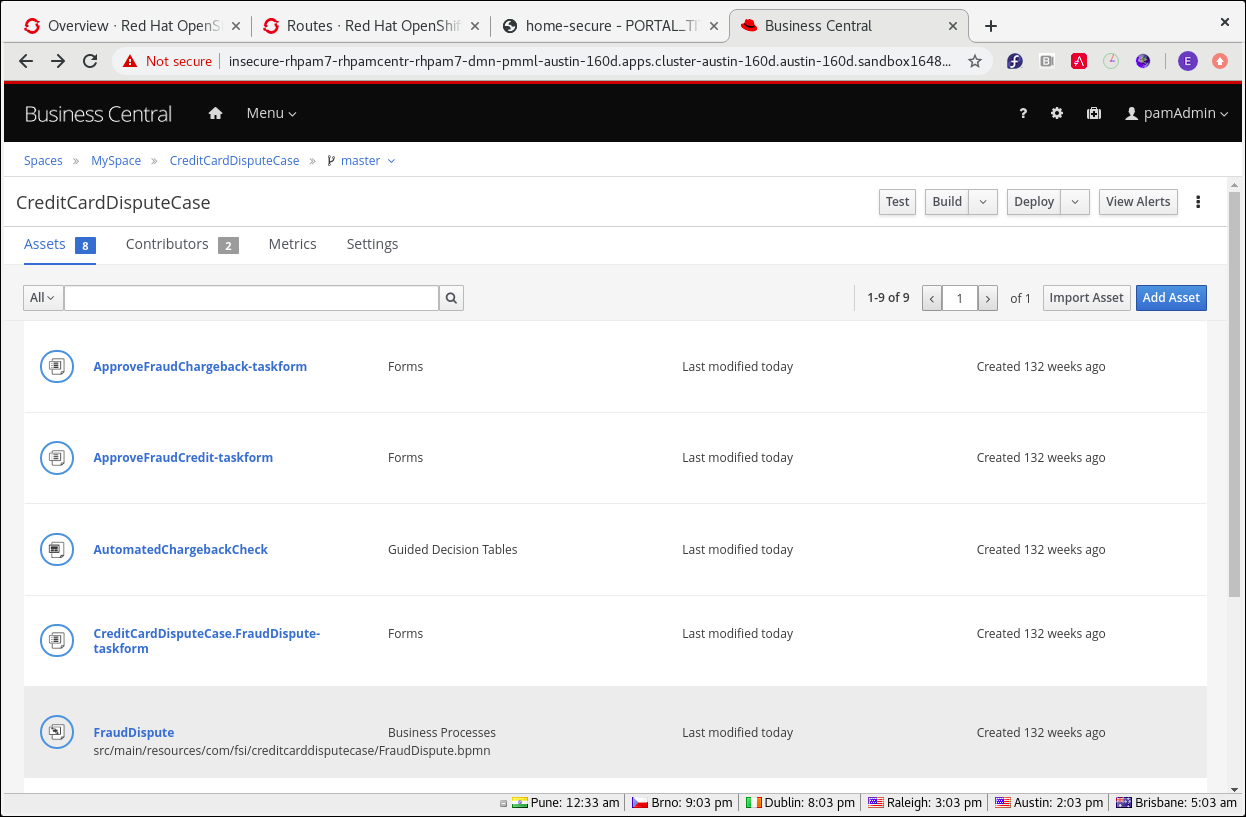
Process variables
When Joe reported the dispute, an instance of the fraudDispute process was created with case ID FR-00000004. The Process Variables tab contains several variables and values specific to Joe’s account, including CaseID, caseFile_cardholderRiskRating (the credit card holder risk rating), and caseFile_disputeRiskRating (the risk rating of this dispute):
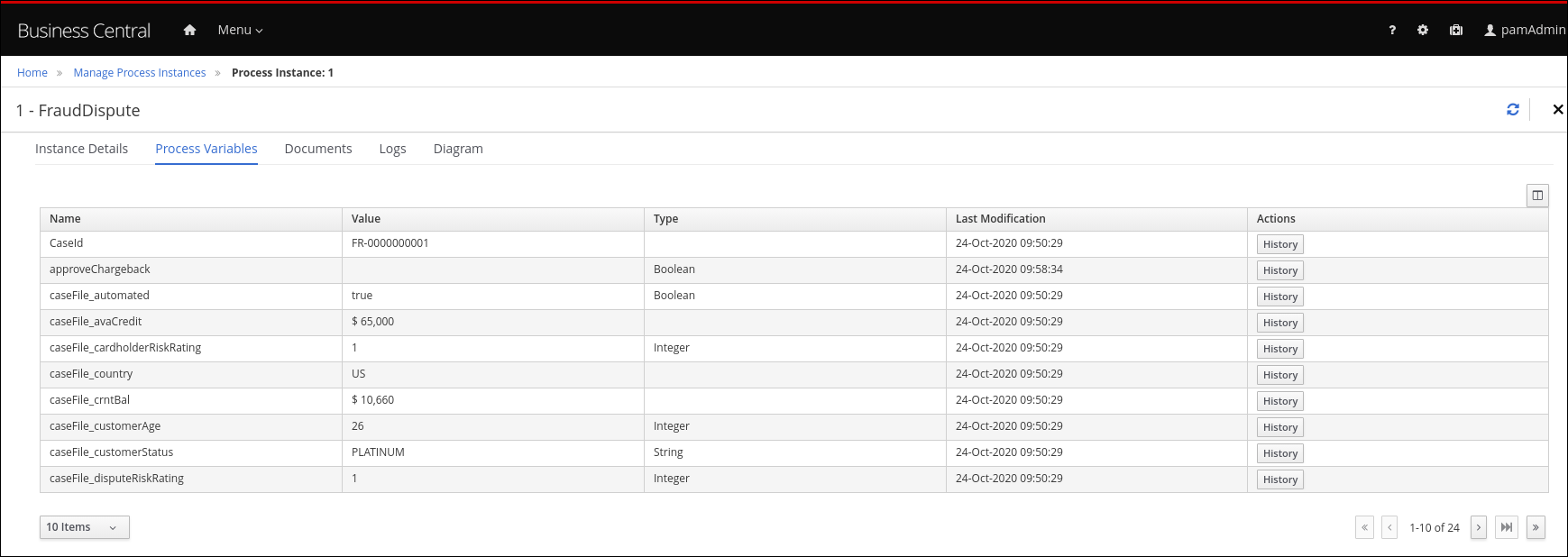
The table also has the casefile_automated variable with the value true. This indicates that the dispute met the criteria to be automatically processed.
Process diagram
The Diagram tab contains the BPMN diagram that shows the decision paths that the bank uses when deciding whether to process a dispute automatically or manually:
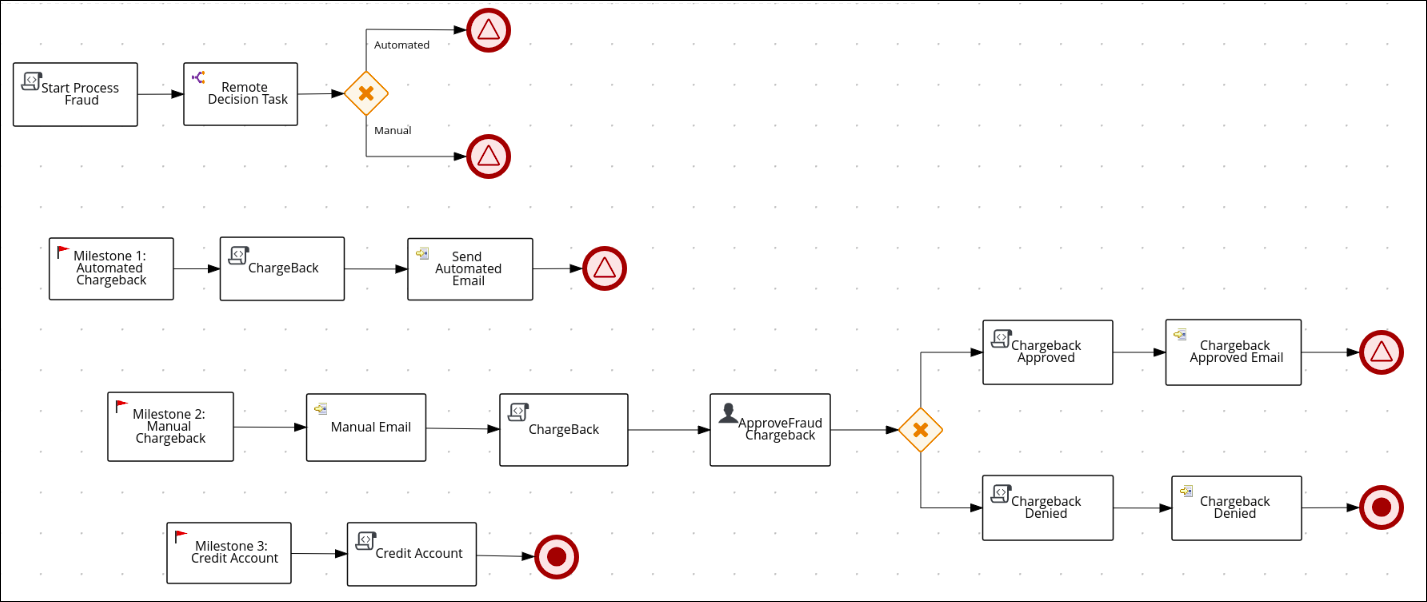
The Decision Task task contains the rules that determine whether the dispute will be automatically charged back to Joe’s account (Milestone 1) or whether more investigation is required (Milestone 2) based on the values of the caseFile_cardholderRiskRating and the caseFile_disputeRiskRating variables. If Joe’s dispute matches the criteria for automatic approval, Milestone 1 is followed and the disputed amount is charged back to his account. This sub-process is very lean and efficient. If Joe’s dispute requires manual evaluation, the sub-process in Milestone 2 is started, which will require some human actor involvement and will take more resources to process.
In this case, the Decision Task task decided to process Joe’s dispute automatically so it followed Milestone 1: Automatic Chargeback.
DMN model
The following simplified DMN model shows the decision process that is part of the fraudDispute Decision Task task:

The input variables are Age (cardholder age), Incident Count (the number of previous disputes for this cardholder), Cardholder Status (standard, silver, gold, platinum), and Fraud Amount.
Red Hat Process Automation Manager uses input variables in decision tables to support digital decisioning. The decision tables are created by human business analysts. The analyst creates a draft business requirement analysis document or spreadsheet that stakeholders review and approve. The project designer then uses the Business Central DMN editor to transfer the data in the analysis document to the DMN model. The Fortress Bank Credit Card Dispute process has two decision tables, the Cardholder Risk Rating table and the Dispute Risk Rating table. The Cardholder Risk Rating table contains three input variables: Incident Count, Cardholder Status, and Age. The Dispute Risk Rating table contains the Cardholder Status input variable. The table calculates the risk of the dispute based on the cardholder status and the amount of the dispute.

Cardholder Risk Rating
Joe is a Silver cardholder over the age of 25. He has had more than two previous disputes, so he has a risk rating of 2. If Joe had no previous disputes, he would have a risk rating of 0.
Dispute Risk Rating
Because Joe is a Silver cardholder and the disputed amount is $40, Joe has a rating of 1 on the Dispute Risk Rating table. If the disputed amount was $140, Joe would have a risk rating of 2.
The following formula, which is implemented as part of the Process Automatically final decision in the DMN model, uses the scores from the two decision tables to determine whether to automatically charge back the disputed amount (Milestone 1) or whether more investigation is needed (Milestone 2).
(Cardholder Risk Rating + Dispute Risk Rating) < 5
If Joe’s overall risk score is less than five, his disputed amount is charged back automatically (Milestone 1). If the overall score is 5 or greater, then his dispute is processed manually (Milestone 2).
Adding machine learning to Red Hat Process Automation Manager digital decisioning
Because Fortress Bank has historical data about its customers, including previous transaction and dispute history, the bank can use that data with machine learning to create predictive models that can be used in the DMN model decision tasks. This results in a more accurate assessment of the risk compared to the decision tables created by business analysts.
Fortress Bank has two sets of PMML files that contain models which more accurately assess risk predictions. One set is based on the linear regression algorithm and the other is based on the random forests algorithm.
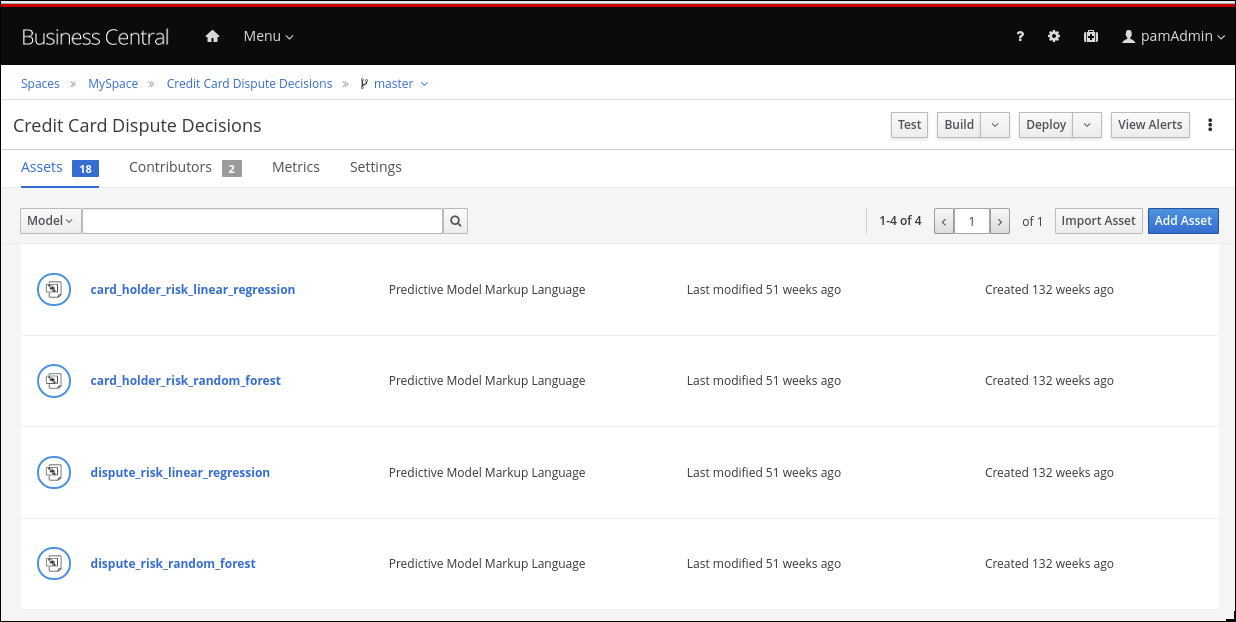
Linear regression is one of the most widely used algorithms in both statistics and machine learning. It uses a linear equation that combines a set of numeric input and output values. Random forests use many decision trees as inputs to create prediction models.
Adding PMML files
Michelle imports the dispute_risk_linear_regression PMML file into her project. She adds the Cardholder Risk Model business model knowledge node to the DMN model and associates the dispute_risk_linear_regression PMML file with the node. Red Hat Process Automation Manager analyzes the PMML file and adds input parameters to the node. Michelle associates the Cardholder Risk Model node with the Dispute Risk Rating.
Michelle then adds the credit_card_holder_risk_linear_regression PMML model to the projects, creates the Dispute Risk Model mode DMN file, creates and associates the credit_card_holder_risk_linear_regression PMML file with the node. Red Hat Process Automation Manager analyzes the PMML file and adds input parameters to the node.
The following image is Michelle’s completed DMN model, which replaces analytical decision tables with the predictive models from the PMML files:
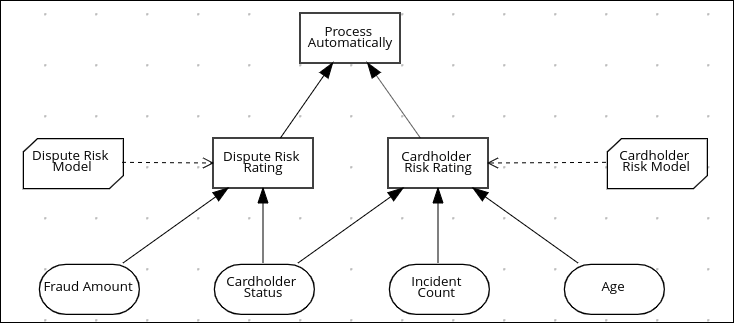
Michelle now returns to the fraudDispute BPMN model and updates the model with the PMML files that she added. She then redeploys the project.
Increased score precision
In this new scenario where Michelle has redeployed the Fortress Bank project with PMML models, we can see what happens when Joe logs in to his Fortress Bank account and reports the same transaction as incorrect. In Business Central, Michelle navigates to the Process Instances window and she sees Joe’s new dispute instance. In the Process Variables tab, Michelle reviews the values of cardHolderRiskRating and the disputeRiskRating. They have changed because the model is now using the PMML files. This provides a much more precise prediction of risk by making use of machine learning models based on historical data. At the same time, the policy of the bank is still enforced by the DMN decision model: the risk predictor is below a specified threshold which allows for this dispute to be processed automatically.
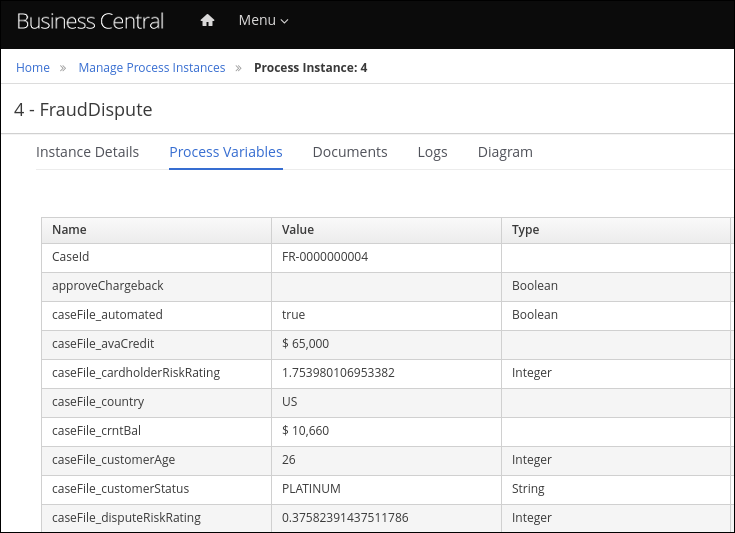
Monitoring
Finally, Fortress Bank uses Prometheus to gather metrics about credit card disputes and Grafana to visualize those metrics in real time. The upper section of the monitor shows the business metrics key performance indicators (KPIs) and the lower section shows the operational metrics KPIs.

91.1. Using a PMML model with a DMN model to resolve credit card transaction disputes
This example shows you how to use Red Hat Process Automation Manager to create a DMN model that uses a PMML model to resolve credit card transaction disputes. When a customer disputes a credit card transaction, the system decides whether or not to process the transaction automatically.
Prerequisites
Red Hat Process Automation Manager is available and the following JAR file has been added to the
~/kie-server.war/WEB-INF/liband~/business-central.war/WEB-INF/libdirectories in your Red Hat Process Automation Manager installation:kie-dmn-jpmml-7.48.0.Final-redhat-00004.jarThis file is available in the Red Hat Decision Manager 7.10 Maven Repository distribution available from the Software Downloads page in the Red Hat Customer Portal (login required). The group ID, artifact ID, and version (GAV) identifier of this file is
org.kie:kie-dmn-jpmml:7.48.0.Final-redhat-00004. For more information, see the "Including PMML models within a DMN file in Business Central" section of Designing a decision service using DMN models.- JPMML Evaluator 1.5.1 JAR file
JPMML Evaluator Extensions 1.5.1 JAR file
These files are required to enable JPMML evaluation in KIE Server and Business Central.
ImportantRed Hat supports integration with the Java Evaluator API for PMML (JPMML) for PMML execution in Red Hat Process Automation Manager. However, Red Hat does not support the JPMML libraries directly. If you include JPMML libraries in your Red Hat Process Automation Manager distribution, see the Openscoring.io licensing terms for JPMML.
Procedure
-
Create the
dtree_risk_predictor.pmmlfile with the contents of the XML example in Section 91.2, “Credit card transaction dispute exercise PMML file”. In Business Central, create the Credit Card Dispute project:
- Navigate to Menu → Design → Projects.
- Click Add Project.
-
In the Name box, enter
Credit Card Disputeand click Add.
In the Assets window of the Credit Card Dispute project, import the
dtree_risk_predictor.pmmlfile into thecompackage: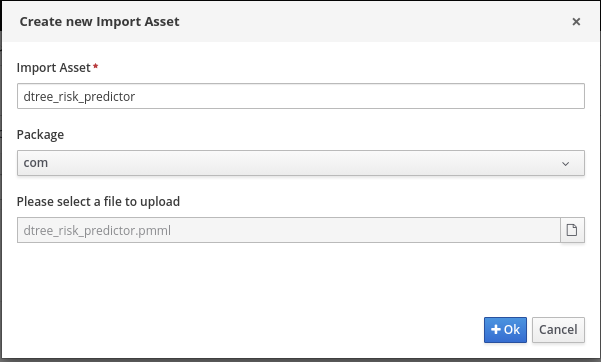
- Click Import Asset.
In the Create new Import Asset dialog, enter
dtree_risk_predictorin the Name box, select com from the Package menu, select thedtree_risk_predictor.pmmlfile, and click OK.The content of the
dtree_risk_predictor.pmmlfile appears in the Overview window.
Create the Dispute Transaction Check DMN model in com package:

- To return to the project window, click Credit Card Dispute in the breadcrumb trail.
- Click Add Asset.
- Click DMN in the asset library.
In the Create new DMN dialog, enter
Dispute Transaction Checkin the Name box, select com from the Package menu, and click OK.The DMN editor opens with the Dispute Transaction Check DMN model.
Create the tTransaction custom data type:
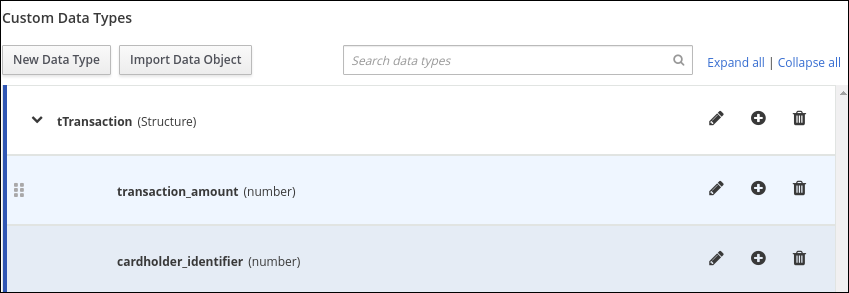
- Click the Data Types tab.
- Click Add a custom Data Type.
-
In the Name box, enter
tTransaction. - Select Structure from the Type menu.
To create the data type, click the check mark.
The tTransaction custom data type appears with one variable row.
-
In the Name field of the variable row, enter
transaction_amount, select Number from the Type menu, and then click the check mark. -
To add a new variable row, click the plus symbol on the
transaction_amountrow. A new row appears. -
In the Name field, enter
cardholder_identifier, select Number from the Type menu, and then click the check mark.
Add the Risk Predictor
dtree_risk_predictor.pmmlmodel:
- In the Included Models window of the DMN editor, click Include Model.
-
In the Include Model dialog, select
dtree_risk_predictor.pmmlfrom the Models menu. -
Enter
Risk Predictorin the Provide a unique name box and click OK.
Create the Risk Predictor Business Knowledge Model (BKM) node with the Risk Predictor and DecisionTreeClassifier model:
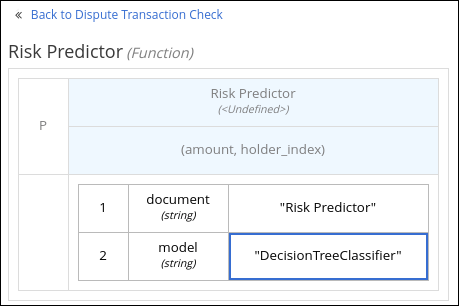
In the Model window of the DMN editor, drag a BKM node to the DMN editor palette.

- Rename the node Risk Predictor.
Click the edit icon located below the trash can icon on the left side of the node.

- Click F in the Risk Predictor box and select PMML from the Select Function Kind menu. The F changes to P.
- Double-click the First select PMML document box and select Risk Predictor.
- Double-click the Second select PMML model box and select DecisionTreeClassifier.
- To return to the DMN editor palette, click Back to Dispute Transaction Check.
Create the Transaction input data node with the data type tTransaction:
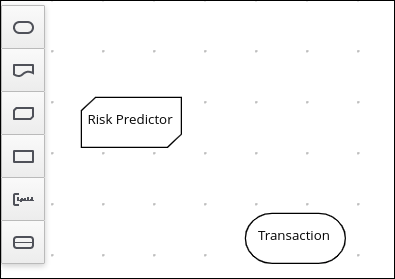
In the Model window of the DMN editor, drag an input data node to the DMN editor palette.

- Rename the node Transaction.
- Select the node then click the properties pencil icon in the upper-right corner of the window.
- In the Properties panel, select Information Item → Data type → tTransaction then close the panel.
Create the Transaction Dispute Risk decision node and add the Transaction node for data input and the Risk Predictor node for the function:

In the Model window of the DMN editor, drag a decision data node to the DMN editor palette.
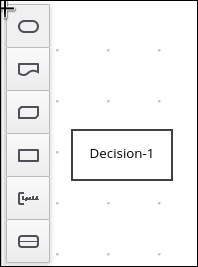
- Rename the node Transaction Dispute Risk.
- Select the Risk Predictor node and drag the arrow from the top right of the node to the Transaction Dispute Risk node.
- Select the Transaction node and drag the arrow from the bottom right of the node to the Transaction Dispute Risk node.
In the Transaction Dispute Risk node, create the Risk predictor invocation function:

- Select the Transaction Dispute Risk node and click the edit icon on the left side of the node.
- Click Select expression and select Invocation from the menu.
- Enter Risk Predictor in the Enter function box.
- Click P1.
-
In the Edit Parameter dialog, enter
amountin the Name box, select number from the Data Type menu, and press the Enter key. - Click Select expression and select Literal expression from the menu.
-
Enter
Transaction.transaction_amountin the box next to amount. - Right-click on 1 and select Insert below. The Edit Parameter dialog opens.
- Enter holder_index in the Name box, select number from the Data Type menu, and press the Enter key.
- Click Select expression on row 2 and select Literal expression from the menu.
-
Enter
Transaction.cardholder_identifierin the box next to amount.
Create the Risk Threshold input data node with the data type number:
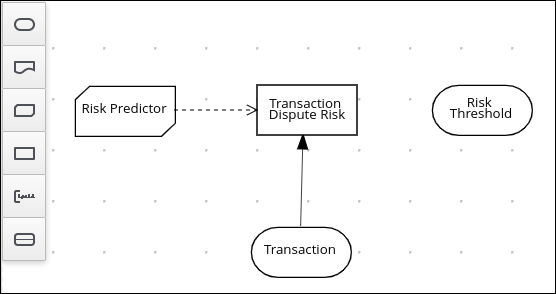
- In the Model window of the DMN editor, drag an input data node to the DMN editor palette.
- Rename the node Risk Threshold.
- Select the node then click the properties pencil icon in the upper-right corner of the window.
- In the Properties panel, select Information Item → Data type → number then close the panel.
Create the Can be automatically processed? decision node that takes as inputs the Transaction Dispute Risk and the Risk threshold nodes:
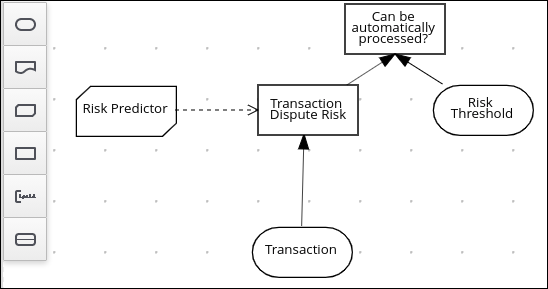
- Drag a decision node to the DMN editor palette and rename it Can be automatically processed?.
- Select the node, then click the edit icon on the upper-left side of the node.
- Click Select expression and then select Literal expression from the menu.
-
Enter
Transaction Dispute Risk.predicted_dispute_risk < Risk Thresholdin the box. - Select the Transaction Dispute Risk node and drag the arrow in the top left of the node to the Can be automatically processed? node.
- Select the Risk Threshold node and drag the arrow from the bottom left of the node to the Can be automatically processed? node.
Save the model and build the project:
- In the DMN editor, click Save.
- If necessary, correct any errors that appear.
- To return to the project window, click Credit Card Dispute in the breadcrumb trail.
- Click Build. The project should successfully build.
Add and run a test scenario:
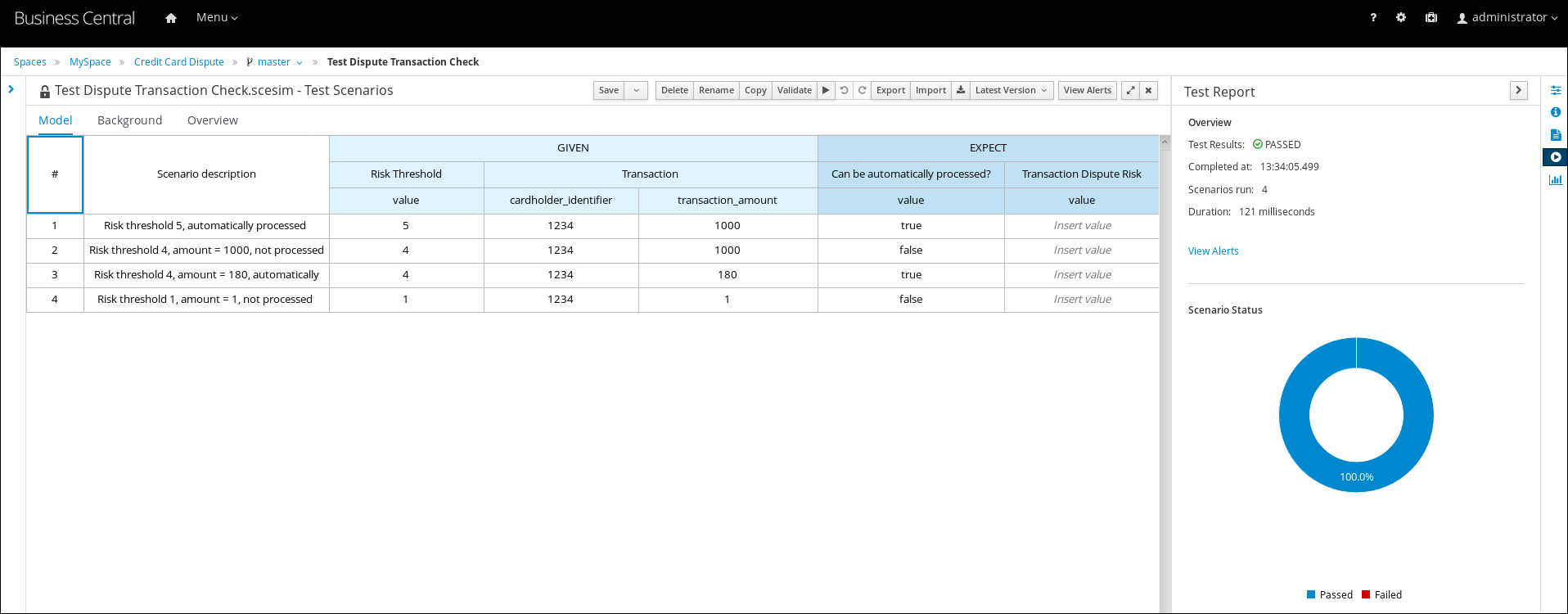
- Click Add Asset.
- Select Test Scenario.
-
In the Create new Test Scenario dialog, enter the name
Test Dispute Transaction Check, select com from the Package menu, and select DMN. - Select Dispute Transaction Check.dmn from the Choose a DMN asset menu and click OK. The test template builds.
Enter the following values and click Save:
NoteDo not add a value to the Transaction Dispute Risk column. This value is determined by the test scenario.
Table 91.1. Test scenario parameters
Description Risk Threshold cardholder_identifier transaction_amount Can be automatically processed? Risk threshold 5, automatically processed
5
1234
1000
true
Risk threshold 4, amount = 1000, not processed
4
1234
1000
false
Risk threshold 4, amount = 180, automatically processed
4
1234
180
true
Risk threshold 1, amount = 1, not processed
1
1234
1
false
- To run the test, click the Play button, to the right of Validate. The results appear in the Test Report panel on the right of the screen.
91.2. Credit card transaction dispute exercise PMML file
Use the following XML content to create the dtree_risk_predictor.pmml file in the Section 91.1, “Using a PMML model with a DMN model to resolve credit card transaction disputes” exercise.
<?xml version="1.0" encoding="UTF-8"?>
<PMML xmlns="http://www.dmg.org/PMML-4_2" xmlns:xsi="http://www.w3.org/2001/XMLSchema-instance" version="4.2" xsi:schemaLocation="http://www.dmg.org/PMML-4_2 http://www.dmg.org/v4-2-1/pmml-4-2.xsd">
<Header copyright="Copyright (c) 2018 Software AG" description="Default Description">
<Application name="Nyoka" version="4.3.0" />
<Timestamp>2020-10-09 14:27:26.622723</Timestamp>
</Header>
<DataDictionary numberOfFields="3">
<DataField name="amount" optype="continuous" dataType="double" />
<DataField name="holder_index" optype="continuous" dataType="double" />
<DataField name="dispute_risk" optype="categorical" dataType="integer">
<Value value="1" />
<Value value="2" />
<Value value="3" />
<Value value="4" />
<Value value="5" />
</DataField>
</DataDictionary>
<TreeModel modelName="DecisionTreeClassifier" functionName="classification" missingValuePenalty="1.0">
<MiningSchema>
<MiningField name="amount" usageType="active" optype="continuous" />
<MiningField name="holder_index" usageType="active" optype="continuous" />
<MiningField name="dispute_risk" usageType="target" optype="categorical" />
</MiningSchema>
<Output>
<OutputField name="probability_1" optype="continuous" dataType="double" feature="probability" value="1" />
<OutputField name="probability_2" optype="continuous" dataType="double" feature="probability" value="2" />
<OutputField name="probability_3" optype="continuous" dataType="double" feature="probability" value="3" />
<OutputField name="probability_4" optype="continuous" dataType="double" feature="probability" value="4" />
<OutputField name="probability_5" optype="continuous" dataType="double" feature="probability" value="5" />
<OutputField name="predicted_dispute_risk" optype="categorical" dataType="integer" feature="predictedValue" />
</Output>
<Node id="0" recordCount="600.0">
<True />
<Node id="1" recordCount="200.0">
<SimplePredicate field="amount" operator="lessOrEqual" value="99.94000244140625" />
<Node id="2" score="2" recordCount="55.0">
<SimplePredicate field="holder_index" operator="lessOrEqual" value="0.5" />
<ScoreDistribution value="1" recordCount="0.0" confidence="0.0" />
<ScoreDistribution value="2" recordCount="55.0" confidence="1.0" />
<ScoreDistribution value="3" recordCount="0.0" confidence="0.0" />
<ScoreDistribution value="4" recordCount="0.0" confidence="0.0" />
<ScoreDistribution value="5" recordCount="0.0" confidence="0.0" />
</Node>
<Node id="3" score="1" recordCount="145.0">
<SimplePredicate field="holder_index" operator="greaterThan" value="0.5" />
<ScoreDistribution value="1" recordCount="145.0" confidence="1.0" />
<ScoreDistribution value="2" recordCount="0.0" confidence="0.0" />
<ScoreDistribution value="3" recordCount="0.0" confidence="0.0" />
<ScoreDistribution value="4" recordCount="0.0" confidence="0.0" />
<ScoreDistribution value="5" recordCount="0.0" confidence="0.0" />
</Node>
</Node>
<Node id="4" recordCount="400.0">
<SimplePredicate field="amount" operator="greaterThan" value="99.94000244140625" />
<Node id="5" recordCount="105.0">
<SimplePredicate field="holder_index" operator="lessOrEqual" value="0.5" />
<Node id="6" score="3" recordCount="54.0">
<SimplePredicate field="amount" operator="lessOrEqual" value="150.4550018310547" />
<ScoreDistribution value="1" recordCount="0.0" confidence="0.0" />
<ScoreDistribution value="2" recordCount="0.0" confidence="0.0" />
<ScoreDistribution value="3" recordCount="54.0" confidence="1.0" />
<ScoreDistribution value="4" recordCount="0.0" confidence="0.0" />
<ScoreDistribution value="5" recordCount="0.0" confidence="0.0" />
</Node>
<Node id="7" recordCount="51.0">
<SimplePredicate field="amount" operator="greaterThan" value="150.4550018310547" />
<Node id="8" recordCount="40.0">
<SimplePredicate field="amount" operator="lessOrEqual" value="200.00499725341797" />
<Node id="9" recordCount="36.0">
<SimplePredicate field="amount" operator="lessOrEqual" value="195.4949951171875" />
<Node id="10" recordCount="2.0">
<SimplePredicate field="amount" operator="lessOrEqual" value="152.2050018310547" />
<Node id="11" score="4" recordCount="1.0">
<SimplePredicate field="amount" operator="lessOrEqual" value="151.31500244140625" />
<ScoreDistribution value="1" recordCount="0.0" confidence="0.0" />
<ScoreDistribution value="2" recordCount="0.0" confidence="0.0" />
<ScoreDistribution value="3" recordCount="0.0" confidence="0.0" />
<ScoreDistribution value="4" recordCount="1.0" confidence="1.0" />
<ScoreDistribution value="5" recordCount="0.0" confidence="0.0" />
</Node>
<Node id="12" score="3" recordCount="1.0">
<SimplePredicate field="amount" operator="greaterThan" value="151.31500244140625" />
<ScoreDistribution value="1" recordCount="0.0" confidence="0.0" />
<ScoreDistribution value="2" recordCount="0.0" confidence="0.0" />
<ScoreDistribution value="3" recordCount="1.0" confidence="1.0" />
<ScoreDistribution value="4" recordCount="0.0" confidence="0.0" />
<ScoreDistribution value="5" recordCount="0.0" confidence="0.0" />
</Node>
</Node>
<Node id="13" recordCount="34.0">
<SimplePredicate field="amount" operator="greaterThan" value="152.2050018310547" />
<Node id="14" recordCount="20.0">
<SimplePredicate field="amount" operator="lessOrEqual" value="176.5050048828125" />
<Node id="15" recordCount="19.0">
<SimplePredicate field="amount" operator="lessOrEqual" value="176.06500244140625" />
<Node id="16" score="4" recordCount="9.0">
<SimplePredicate field="amount" operator="lessOrEqual" value="166.6449966430664" />
<ScoreDistribution value="1" recordCount="0.0" confidence="0.0" />
<ScoreDistribution value="2" recordCount="0.0" confidence="0.0" />
<ScoreDistribution value="3" recordCount="0.0" confidence="0.0" />
<ScoreDistribution value="4" recordCount="9.0" confidence="1.0" />
<ScoreDistribution value="5" recordCount="0.0" confidence="0.0" />
</Node>
<Node id="17" recordCount="10.0">
<SimplePredicate field="amount" operator="greaterThan" value="166.6449966430664" />
<Node id="18" score="3" recordCount="1.0">
<SimplePredicate field="amount" operator="lessOrEqual" value="167.97999572753906" />
<ScoreDistribution value="1" recordCount="0.0" confidence="0.0" />
<ScoreDistribution value="2" recordCount="0.0" confidence="0.0" />
<ScoreDistribution value="3" recordCount="1.0" confidence="1.0" />
<ScoreDistribution value="4" recordCount="0.0" confidence="0.0" />
<ScoreDistribution value="5" recordCount="0.0" confidence="0.0" />
</Node>
<Node id="19" score="4" recordCount="9.0">
<SimplePredicate field="amount" operator="greaterThan" value="167.97999572753906" />
<ScoreDistribution value="1" recordCount="0.0" confidence="0.0" />
<ScoreDistribution value="2" recordCount="0.0" confidence="0.0" />
<ScoreDistribution value="3" recordCount="0.0" confidence="0.0" />
<ScoreDistribution value="4" recordCount="9.0" confidence="1.0" />
<ScoreDistribution value="5" recordCount="0.0" confidence="0.0" />
</Node>
</Node>
</Node>
<Node id="20" score="3" recordCount="1.0">
<SimplePredicate field="amount" operator="greaterThan" value="176.06500244140625" />
<ScoreDistribution value="1" recordCount="0.0" confidence="0.0" />
<ScoreDistribution value="2" recordCount="0.0" confidence="0.0" />
<ScoreDistribution value="3" recordCount="1.0" confidence="1.0" />
<ScoreDistribution value="4" recordCount="0.0" confidence="0.0" />
<ScoreDistribution value="5" recordCount="0.0" confidence="0.0" />
</Node>
</Node>
<Node id="21" score="4" recordCount="14.0">
<SimplePredicate field="amount" operator="greaterThan" value="176.5050048828125" />
<ScoreDistribution value="1" recordCount="0.0" confidence="0.0" />
<ScoreDistribution value="2" recordCount="0.0" confidence="0.0" />
<ScoreDistribution value="3" recordCount="0.0" confidence="0.0" />
<ScoreDistribution value="4" recordCount="14.0" confidence="1.0" />
<ScoreDistribution value="5" recordCount="0.0" confidence="0.0" />
</Node>
</Node>
</Node>
<Node id="22" recordCount="4.0">
<SimplePredicate field="amount" operator="greaterThan" value="195.4949951171875" />
<Node id="23" score="3" recordCount="1.0">
<SimplePredicate field="amount" operator="lessOrEqual" value="195.76499938964844" />
<ScoreDistribution value="1" recordCount="0.0" confidence="0.0" />
<ScoreDistribution value="2" recordCount="0.0" confidence="0.0" />
<ScoreDistribution value="3" recordCount="1.0" confidence="1.0" />
<ScoreDistribution value="4" recordCount="0.0" confidence="0.0" />
<ScoreDistribution value="5" recordCount="0.0" confidence="0.0" />
</Node>
<Node id="24" recordCount="3.0">
<SimplePredicate field="amount" operator="greaterThan" value="195.76499938964844" />
<Node id="25" score="4" recordCount="1.0">
<SimplePredicate field="amount" operator="lessOrEqual" value="196.74500274658203" />
<ScoreDistribution value="1" recordCount="0.0" confidence="0.0" />
<ScoreDistribution value="2" recordCount="0.0" confidence="0.0" />
<ScoreDistribution value="3" recordCount="0.0" confidence="0.0" />
<ScoreDistribution value="4" recordCount="1.0" confidence="1.0" />
<ScoreDistribution value="5" recordCount="0.0" confidence="0.0" />
</Node>
<Node id="26" recordCount="2.0">
<SimplePredicate field="amount" operator="greaterThan" value="196.74500274658203" />
<Node id="27" score="3" recordCount="1.0">
<SimplePredicate field="amount" operator="lessOrEqual" value="197.5800018310547" />
<ScoreDistribution value="1" recordCount="0.0" confidence="0.0" />
<ScoreDistribution value="2" recordCount="0.0" confidence="0.0" />
<ScoreDistribution value="3" recordCount="1.0" confidence="1.0" />
<ScoreDistribution value="4" recordCount="0.0" confidence="0.0" />
<ScoreDistribution value="5" recordCount="0.0" confidence="0.0" />
</Node>
<Node id="28" score="4" recordCount="1.0">
<SimplePredicate field="amount" operator="greaterThan" value="197.5800018310547" />
<ScoreDistribution value="1" recordCount="0.0" confidence="0.0" />
<ScoreDistribution value="2" recordCount="0.0" confidence="0.0" />
<ScoreDistribution value="3" recordCount="0.0" confidence="0.0" />
<ScoreDistribution value="4" recordCount="1.0" confidence="1.0" />
<ScoreDistribution value="5" recordCount="0.0" confidence="0.0" />
</Node>
</Node>
</Node>
</Node>
</Node>
<Node id="29" score="5" recordCount="11.0">
<SimplePredicate field="amount" operator="greaterThan" value="200.00499725341797" />
<ScoreDistribution value="1" recordCount="0.0" confidence="0.0" />
<ScoreDistribution value="2" recordCount="0.0" confidence="0.0" />
<ScoreDistribution value="3" recordCount="0.0" confidence="0.0" />
<ScoreDistribution value="4" recordCount="0.0" confidence="0.0" />
<ScoreDistribution value="5" recordCount="11.0" confidence="1.0" />
</Node>
</Node>
</Node>
<Node id="30" recordCount="295.0">
<SimplePredicate field="holder_index" operator="greaterThan" value="0.5" />
<Node id="31" score="2" recordCount="170.0">
<SimplePredicate field="amount" operator="lessOrEqual" value="150.93499755859375" />
<ScoreDistribution value="1" recordCount="0.0" confidence="0.0" />
<ScoreDistribution value="2" recordCount="170.0" confidence="1.0" />
<ScoreDistribution value="3" recordCount="0.0" confidence="0.0" />
<ScoreDistribution value="4" recordCount="0.0" confidence="0.0" />
<ScoreDistribution value="5" recordCount="0.0" confidence="0.0" />
</Node>
<Node id="32" recordCount="125.0">
<SimplePredicate field="amount" operator="greaterThan" value="150.93499755859375" />
<Node id="33" recordCount="80.0">
<SimplePredicate field="holder_index" operator="lessOrEqual" value="2.5" />
<Node id="34" recordCount="66.0">
<SimplePredicate field="amount" operator="lessOrEqual" value="199.13500213623047" />
<Node id="35" score="3" recordCount="10.0">
<SimplePredicate field="amount" operator="lessOrEqual" value="155.56999969482422" />
<ScoreDistribution value="1" recordCount="0.0" confidence="0.0" />
<ScoreDistribution value="2" recordCount="0.0" confidence="0.0" />
<ScoreDistribution value="3" recordCount="10.0" confidence="1.0" />
<ScoreDistribution value="4" recordCount="0.0" confidence="0.0" />
<ScoreDistribution value="5" recordCount="0.0" confidence="0.0" />
</Node>
<Node id="36" recordCount="56.0">
<SimplePredicate field="amount" operator="greaterThan" value="155.56999969482422" />
<Node id="37" score="2" recordCount="1.0">
<SimplePredicate field="amount" operator="lessOrEqual" value="155.9000015258789" />
<ScoreDistribution value="1" recordCount="0.0" confidence="0.0" />
<ScoreDistribution value="2" recordCount="1.0" confidence="1.0" />
<ScoreDistribution value="3" recordCount="0.0" confidence="0.0" />
<ScoreDistribution value="4" recordCount="0.0" confidence="0.0" />
<ScoreDistribution value="5" recordCount="0.0" confidence="0.0" />
</Node>
<Node id="38" recordCount="55.0">
<SimplePredicate field="amount" operator="greaterThan" value="155.9000015258789" />
<Node id="39" recordCount="31.0">
<SimplePredicate field="amount" operator="lessOrEqual" value="176.3699951171875" />
<Node id="40" recordCount="30.0">
<SimplePredicate field="amount" operator="lessOrEqual" value="175.72000122070312" />
<Node id="41" recordCount="19.0">
<SimplePredicate field="amount" operator="lessOrEqual" value="168.06999969482422" />
<Node id="42" recordCount="6.0">
<SimplePredicate field="amount" operator="lessOrEqual" value="158.125" />
<Node id="43" score="3" recordCount="5.0">
<SimplePredicate field="amount" operator="lessOrEqual" value="157.85499572753906" />
<ScoreDistribution value="1" recordCount="0.0" confidence="0.0" />
<ScoreDistribution value="2" recordCount="0.0" confidence="0.0" />
<ScoreDistribution value="3" recordCount="5.0" confidence="1.0" />
<ScoreDistribution value="4" recordCount="0.0" confidence="0.0" />
<ScoreDistribution value="5" recordCount="0.0" confidence="0.0" />
</Node>
<Node id="44" score="2" recordCount="1.0">
<SimplePredicate field="amount" operator="greaterThan" value="157.85499572753906" />
<ScoreDistribution value="1" recordCount="0.0" confidence="0.0" />
<ScoreDistribution value="2" recordCount="1.0" confidence="1.0" />
<ScoreDistribution value="3" recordCount="0.0" confidence="0.0" />
<ScoreDistribution value="4" recordCount="0.0" confidence="0.0" />
<ScoreDistribution value="5" recordCount="0.0" confidence="0.0" />
</Node>
</Node>
<Node id="45" score="3" recordCount="13.0">
<SimplePredicate field="amount" operator="greaterThan" value="158.125" />
<ScoreDistribution value="1" recordCount="0.0" confidence="0.0" />
<ScoreDistribution value="2" recordCount="0.0" confidence="0.0" />
<ScoreDistribution value="3" recordCount="13.0" confidence="1.0" />
<ScoreDistribution value="4" recordCount="0.0" confidence="0.0" />
<ScoreDistribution value="5" recordCount="0.0" confidence="0.0" />
</Node>
</Node>
<Node id="46" recordCount="11.0">
<SimplePredicate field="amount" operator="greaterThan" value="168.06999969482422" />
<Node id="47" score="2" recordCount="1.0">
<SimplePredicate field="amount" operator="lessOrEqual" value="168.69499969482422" />
<ScoreDistribution value="1" recordCount="0.0" confidence="0.0" />
<ScoreDistribution value="2" recordCount="1.0" confidence="1.0" />
<ScoreDistribution value="3" recordCount="0.0" confidence="0.0" />
<ScoreDistribution value="4" recordCount="0.0" confidence="0.0" />
<ScoreDistribution value="5" recordCount="0.0" confidence="0.0" />
</Node>
<Node id="48" recordCount="10.0">
<SimplePredicate field="amount" operator="greaterThan" value="168.69499969482422" />
<Node id="49" recordCount="4.0">
<SimplePredicate field="holder_index" operator="lessOrEqual" value="1.5" />
<Node id="50" score="2" recordCount="1.0">
<SimplePredicate field="amount" operator="lessOrEqual" value="172.0250015258789" />
<ScoreDistribution value="1" recordCount="0.0" confidence="0.0" />
<ScoreDistribution value="2" recordCount="1.0" confidence="1.0" />
<ScoreDistribution value="3" recordCount="0.0" confidence="0.0" />
<ScoreDistribution value="4" recordCount="0.0" confidence="0.0" />
<ScoreDistribution value="5" recordCount="0.0" confidence="0.0" />
</Node>
<Node id="51" score="3" recordCount="3.0">
<SimplePredicate field="amount" operator="greaterThan" value="172.0250015258789" />
<ScoreDistribution value="1" recordCount="0.0" confidence="0.0" />
<ScoreDistribution value="2" recordCount="0.0" confidence="0.0" />
<ScoreDistribution value="3" recordCount="3.0" confidence="1.0" />
<ScoreDistribution value="4" recordCount="0.0" confidence="0.0" />
<ScoreDistribution value="5" recordCount="0.0" confidence="0.0" />
</Node>
</Node>
<Node id="52" score="3" recordCount="6.0">
<SimplePredicate field="holder_index" operator="greaterThan" value="1.5" />
<ScoreDistribution value="1" recordCount="0.0" confidence="0.0" />
<ScoreDistribution value="2" recordCount="0.0" confidence="0.0" />
<ScoreDistribution value="3" recordCount="6.0" confidence="1.0" />
<ScoreDistribution value="4" recordCount="0.0" confidence="0.0" />
<ScoreDistribution value="5" recordCount="0.0" confidence="0.0" />
</Node>
</Node>
</Node>
</Node>
<Node id="53" score="2" recordCount="1.0">
<SimplePredicate field="amount" operator="greaterThan" value="175.72000122070312" />
<ScoreDistribution value="1" recordCount="0.0" confidence="0.0" />
<ScoreDistribution value="2" recordCount="1.0" confidence="1.0" />
<ScoreDistribution value="3" recordCount="0.0" confidence="0.0" />
<ScoreDistribution value="4" recordCount="0.0" confidence="0.0" />
<ScoreDistribution value="5" recordCount="0.0" confidence="0.0" />
</Node>
</Node>
<Node id="54" recordCount="24.0">
<SimplePredicate field="amount" operator="greaterThan" value="176.3699951171875" />
<Node id="55" score="3" recordCount="16.0">
<SimplePredicate field="amount" operator="lessOrEqual" value="192.0999984741211" />
<ScoreDistribution value="1" recordCount="0.0" confidence="0.0" />
<ScoreDistribution value="2" recordCount="0.0" confidence="0.0" />
<ScoreDistribution value="3" recordCount="16.0" confidence="1.0" />
<ScoreDistribution value="4" recordCount="0.0" confidence="0.0" />
<ScoreDistribution value="5" recordCount="0.0" confidence="0.0" />
</Node>
<Node id="56" recordCount="8.0">
<SimplePredicate field="amount" operator="greaterThan" value="192.0999984741211" />
<Node id="57" score="2" recordCount="1.0">
<SimplePredicate field="amount" operator="lessOrEqual" value="192.75499725341797" />
<ScoreDistribution value="1" recordCount="0.0" confidence="0.0" />
<ScoreDistribution value="2" recordCount="1.0" confidence="1.0" />
<ScoreDistribution value="3" recordCount="0.0" confidence="0.0" />
<ScoreDistribution value="4" recordCount="0.0" confidence="0.0" />
<ScoreDistribution value="5" recordCount="0.0" confidence="0.0" />
</Node>
<Node id="58" score="3" recordCount="7.0">
<SimplePredicate field="amount" operator="greaterThan" value="192.75499725341797" />
<ScoreDistribution value="1" recordCount="0.0" confidence="0.0" />
<ScoreDistribution value="2" recordCount="0.0" confidence="0.0" />
<ScoreDistribution value="3" recordCount="7.0" confidence="1.0" />
<ScoreDistribution value="4" recordCount="0.0" confidence="0.0" />
<ScoreDistribution value="5" recordCount="0.0" confidence="0.0" />
</Node>
</Node>
</Node>
</Node>
</Node>
</Node>
<Node id="59" recordCount="14.0">
<SimplePredicate field="amount" operator="greaterThan" value="199.13500213623047" />
<Node id="60" score="5" recordCount="10.0">
<SimplePredicate field="holder_index" operator="lessOrEqual" value="1.5" />
<ScoreDistribution value="1" recordCount="0.0" confidence="0.0" />
<ScoreDistribution value="2" recordCount="0.0" confidence="0.0" />
<ScoreDistribution value="3" recordCount="0.0" confidence="0.0" />
<ScoreDistribution value="4" recordCount="0.0" confidence="0.0" />
<ScoreDistribution value="5" recordCount="10.0" confidence="1.0" />
</Node>
<Node id="61" score="4" recordCount="4.0">
<SimplePredicate field="holder_index" operator="greaterThan" value="1.5" />
<ScoreDistribution value="1" recordCount="0.0" confidence="0.0" />
<ScoreDistribution value="2" recordCount="0.0" confidence="0.0" />
<ScoreDistribution value="3" recordCount="0.0" confidence="0.0" />
<ScoreDistribution value="4" recordCount="4.0" confidence="1.0" />
<ScoreDistribution value="5" recordCount="0.0" confidence="0.0" />
</Node>
</Node>
</Node>
<Node id="62" recordCount="45.0">
<SimplePredicate field="holder_index" operator="greaterThan" value="2.5" />
<Node id="63" score="2" recordCount="37.0">
<SimplePredicate field="amount" operator="lessOrEqual" value="199.13999938964844" />
<ScoreDistribution value="1" recordCount="0.0" confidence="0.0" />
<ScoreDistribution value="2" recordCount="37.0" confidence="1.0" />
<ScoreDistribution value="3" recordCount="0.0" confidence="0.0" />
<ScoreDistribution value="4" recordCount="0.0" confidence="0.0" />
<ScoreDistribution value="5" recordCount="0.0" confidence="0.0" />
</Node>
<Node id="64" score="4" recordCount="8.0">
<SimplePredicate field="amount" operator="greaterThan" value="199.13999938964844" />
<ScoreDistribution value="1" recordCount="0.0" confidence="0.0" />
<ScoreDistribution value="2" recordCount="0.0" confidence="0.0" />
<ScoreDistribution value="3" recordCount="0.0" confidence="0.0" />
<ScoreDistribution value="4" recordCount="8.0" confidence="1.0" />
<ScoreDistribution value="5" recordCount="0.0" confidence="0.0" />
</Node>
</Node>
</Node>
</Node>
</Node>
</Node>
</TreeModel>
</PMML>
